It’s Time for Technology to Serve all Humankind with Unconditional Basic Income
(The text below is a speech I wrote for a keynote in Sweden in late 2017. The PowerPoint is downloadable, as is a video recording of the speech itself.)
Imagine a year where what we’ve long taken for granted, that technology destroys jobs but also creates new and better jobs, is discovered to no longer be true. Instead, machines permanently displace human labor, and what new jobs are created, are mostly worse jobs.
An ever decreasing percentage of the population is employed, and for a majority of those left in the labor market, incomes decrease, hours worked increase, monthly income variance grows more extreme, time between jobs grows, jobs themselves become more akin to tasks, employer-provided benefits become more rare, and the bonds that hold society together begin to fray as inequality grows ever more extreme.
What year do you predict such a future comes to pass? 2030? 2040? 2050 and beyond if even then?
The answer will vary nation by nation, but in the US, the answer is right around 1990. Yes, it already happened. It’s not in the future. It’s in the past.
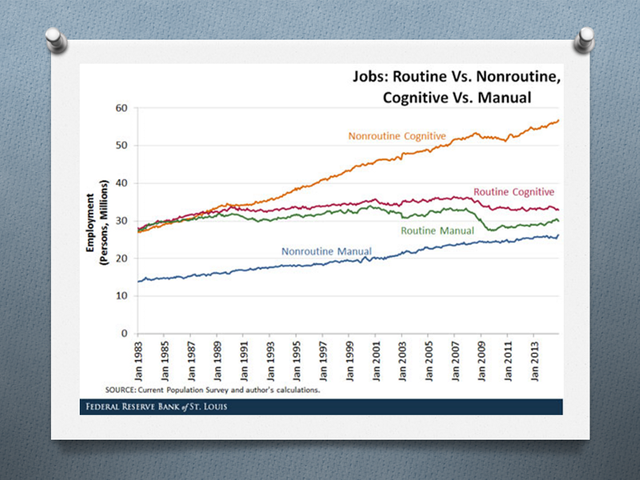
1990 was the year routine job growth flat-lined. It’s also when hours worked per year stopped declining and started increasing again for the first time since the Great Depression. Since 2000, the percentage of the population employed has trended downward. Peak human labor in the US appears to have occurred 17 years ago.
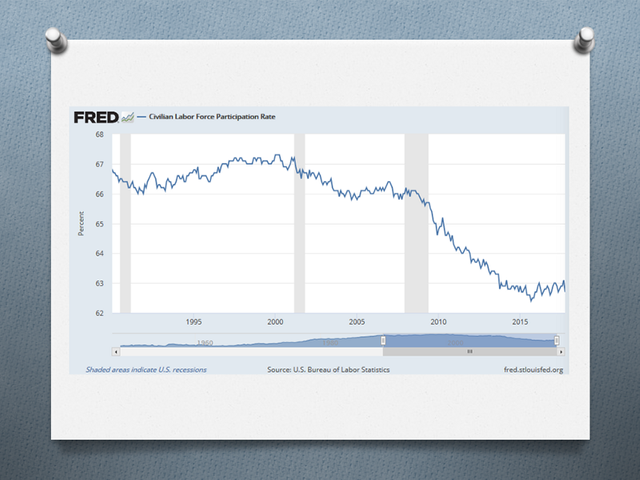
This is the story of technological unemployment brought on by automation, and I’m here to tell you, it’s not some future what-if scenario. It’s real and it’s a clear and present danger to all of human civilization, unless appropriate actions are taken, and soon, to transform it from devastation to emancipation — actions everyone in this room need to seriously consider.
I’m also here to tell you what single action we most need to take, along with a plethora of reasons why I believe there’s no other action of greater importance to the future of the human race. That single most important action is the decoupling of income from work, through a policy known as unconditional basic income or UBI for short. However, before I dive into that, I’d like to journey back a bit further into the past, to the moment humankind discovered tool use…
In this scene from Kubrick’s 2001: A Space Odyssey, we’re shown a historic moment in time where primitive man used the first tool. It’s a bone, and used like a club, it allows a physically weaker group to overpower a physically stronger group. The story is of course fictional, but at some point in time we as humans did use our first tool, and ever since that day we’ve been able to accomplish increasingly more with increasingly less.
Buckminster Fuller referred to this ongoing process as “ephemeralization.” Its theoretical endpoint exists as an asymptote that we can only approach but never reach, where we gain the ability to accomplish everything with nothing. This should sound great. It is. But there’s a catch. There’s always a catch.
The catch is of our own making. The catch, and it’s a big one, is two-fold. First, we require the exchange of money for the basic necessities of life like food and shelter. And second, we require the exchange of work in order to obtain money. The result of this pairing is that we require the exchange of work to exist. So as long as everyone can exchange their labor for income, everyone can theoretically survive in a system where private property is established and enforced. However, tool use throws an unavoidable wrench into this system.
That wrench is technological unemployment.
If we require money to live, and money can only be obtained by selling one’s labor, how do we obtain money to live when machines can do almost everything we can do, more cheaply, more consistently, more safely, more quickly, and overall more efficiently than we ourselves can? It’s one thing for tools like bones to perform physical labor. What happens when 21st century bones are performing mental labor, and learning at a rate we can’t match?
There can only be three solutions, or mix thereof, to this self-created conundrum based on our two-fold catch.
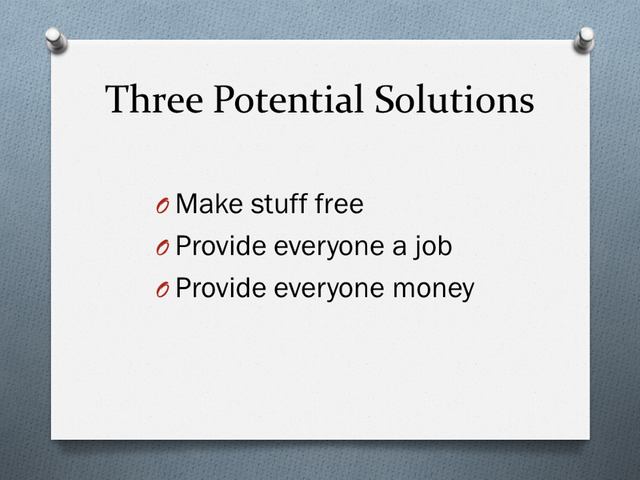
We can either stop requiring the exchange of money for basic needs, essentially making certain things like food, water, and shelter entirely free.
Or we can guarantee that everyone can always find paid work for enough income to exchange for the fulfillment of basic needs.
Or we can stop requiring the exchange of work for money by paying everyone an income whether they work or not, and the amount would just need to be sufficient to cover basic needs.
The first option would eliminate the price system for basic goods and services. This would in turn cripple the ability to calculate just what to produce, how much of it to produce, who gets what, when they get it, where it’s needed, how often, and so on. This option is a planned economy for basic goods and services where the answers to such questions are centralized.
Free food may sound good, but then there’s no limit. We already waste half our food supply. Making it free would lead to even more waste just like making gas cheaper leads to even more driving. Whatever is free also hurts business owners who sell it for a price. Not many people know this history anymore, but in the US, food stamps were a response to handing out free food from the backs of trucks, literal “handouts”. People who received these handouts weren’t going to stores, and that meant other stuff also wasn’t getting bought. Food stamps were seen as a more efficient way of getting food to people, in a way that got customers into markets, stimulating the economy.
Also consider housing. Why should someone in New York City and someone in the rural countryside both get the exact same price of $0 for housing? Is that fair? And if living in NY was free, wouldn’t even more people move there? The market is a distributed calculator. Supply and demand using money as a signaling device works to distribute resources without centralized decision making.
Removing price signals for things like food and housing may sound good on its face, but it would have unintended consequences from the return of breadlines where the unlucky have too little, to increased wastefulness where the lucky have far more than they need.
The second of our three options, guaranteeing work, would guarantee that in a world of machines able to do an increasing amount of work better than us, the work we could guarantee ourselves would be increasingly pointless — the equivalent of digging holes and filling them, or making inspectors to inspect inspectors.
This is the job guarantee (or JG for short) and in a world where work is already no longer working, it makes little sense. As Milton Friedman said, if the goal is jobs, why not use spoons instead of shovels? It also involves asking the same kind of questions as a planned economy.
What are the jobs? Where are they located? Is all work paid the same or is some work paid more? If the same, how’s that fair for those doing harder work? If different, who gets the easier work? Is it possible the answer is not people of color? What about those with disabilities who are told they’re not disabled enough? What about people already doing work of immense value that isn’t even considered work?
Would 100% of all unpaid work be compensated, especially care work? Would all open source coding be compensated? Can someone be fired from a guaranteed job? If not, why bother doing anything if they hate the job and would rather be doing something else? If they can be fired, doesn’t someone else have to hire them, creating an infinite loop of fully disengaged labor? What about people who already have jobs and are barely getting by? How do they benefit? What about those who love their jobs but simply need a raise?
What about the costs required above and beyond the JG wages in middle management and administration? Government-created jobs tend to cost far more than the money they provide as income, commonly more than 6 figures. Finally, worldwide, only 13% of workers are engaged by their jobs. How would creating even more jobs help to change this? These are questions JG advocates have no real answers for, aside from, jobs are good, let’s make more of them, never considering the possibility that perhaps jobs have become the problem, not the solution, which brings me to our third option.
Option three would fully preserve the price system and entirely avoid the pitfalls of unnecessary work. In fact, it would not only preserve the price system, but enhance it, and not only avoid the creation of unnecessary work, but reduce it. This third option is the unconditional basic income. If technological unemployment is the Gordian Knot of the 21st century, UBI is the sword that slices through it. By simply severing the connection between income and work through the unconditional provision of an income for life that’s always sufficient for basic needs, the fear of technological unemployment is eliminated. It doesn’t stop there though, because the provision of basic income has a multitude of repercussions beyond the elimination of fear, and these repercussions are themselves systemically transformative.
Now, here I am presenting both a problem and a solution, but many of you may still believe the problem isn’t real, and that the solution is hogwash. Fair enough. That’s what I’m here for. So now I’m going to dive deep into technological unemployment, and then even deeper into basic income. Are you ready?
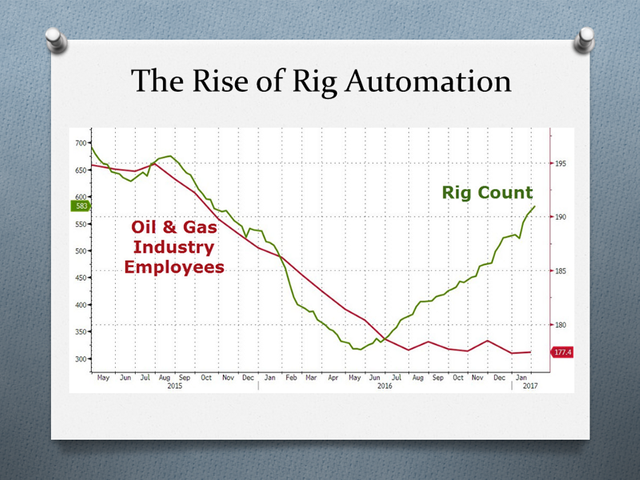
Let’s start here. This one chart encapsulates the automation of human labor, like none other I’ve ever seen so far.
What should be immediately apparent is that as the number of oil rigs declined in the US due to falling oil prices, so did the number of workers the oil industry employed. But when the number of oil rigs began to rebound, the number of workers employed didn’t. That’s an important observation, but it’s not the only one.
Another is, have you even heard of Iron Roughnecks? They’re basically robotic drill hands, and they’re part of the reason for oil drilling jobs not rebounding. Thanks to investments in such automation, what once took a crew of 20 is expected to soon only need 5. This is part of the reason that after the oil industry’s global downturn shed 440,000 of its jobs, it’s now expected that half of those will never return.
The other reason those jobs aren’t coming back, is that many of those jobs simply stopped being necessary years ago. When you’re making hand over fist like the oil industry was at $100 per barrel, being lean and mean is not your concern. However, when belts need tightening, efficiency gains in importance, and unnecessary human labor is inefficient. If a job can be done with 10 people, why hire 20 back?
So that’s what happened here, and the process was just over two years. TWO YEARS. That’s how quickly an industry began more heavily investing in automation and ridding itself of extraneous human labor. It also just happened last year, and few people know anything about it.
This is the real story of automation. It’s a story of heads buried in the sand. Human labor is simply unnecessary overhead that can be squeezed out to increase profits. People deny that fact, and they deny it with wishful thinking.
The main wish is that although jobs are lost due to new technologies, new ones are always created. The unasked question is the nature of those jobs. What kind of jobs are we creating? What kind of skills do they require? How much do they pay? What are their hours and durations? How much meaning do they provide?
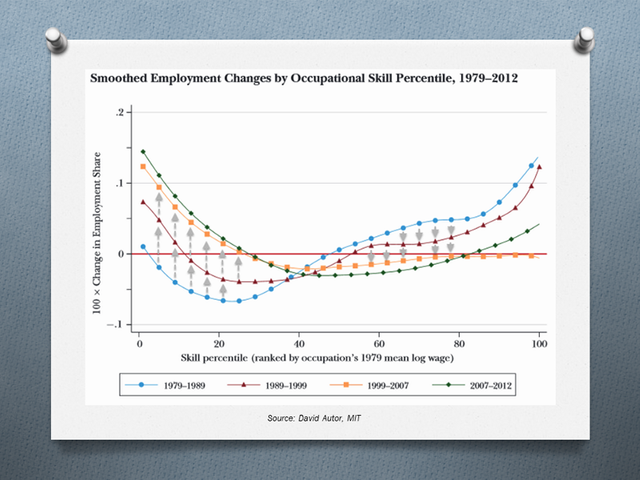
In the US, for four decades, low-skill jobs have grown to fill the vacuum created by the loss of middle-skill jobs. Yes, new high-skill jobs were created too, but the net growth is in low-skill employment. And that also makes complete sense.
The jobs to automate first are those that pay humans the most money, but not so much money due to such a high skill requirement that technology isn’t up to the task. Then as technology gets cheaper, it makes sense to automate lower and lower-skill jobs, and as technology gets more capable, it makes sense to automate increasingly high-skill jobs.
The loss of middle-skill jobs first is exactly what we should expect as a result of automation, and it’s exactly what we see. Not only in the US, but in nation after nation, the middle is being hollowed out everywhere.
As jobs are automated from the middle out, because people need money to live, and jobs provide money, people find whatever jobs they can get. As a result, people compete against each other, and the nature of jobs worsens. Except for those moving on to new high-skill jobs, wages go down. Full-time goes to part-time. Employee goes to contractor. Paychecks go from every two weeks like clockwork to, “I really hope I get paid before rent is due.”
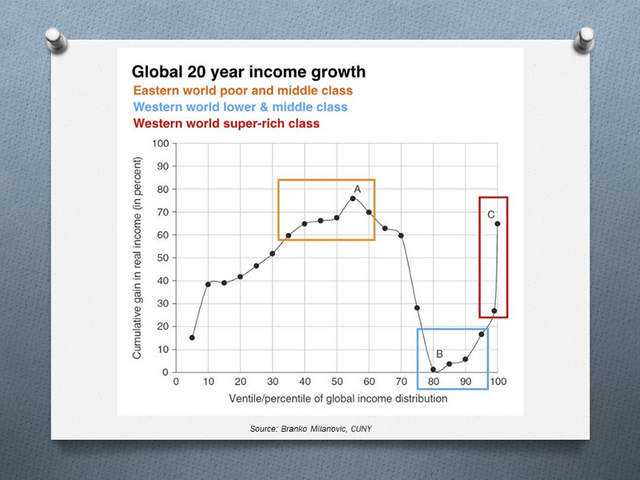
All of this is also true on a global scale. Worldwide, the middle is being eroded as the middle classes of more developed nations compete against machines, and also the cheaper labor of less developed nations, directly thanks to the technology that makes a globalized labor market possible.
Additionally, and this confuses people, automation can actually slow productivity. How? Because we’re automating more productive jobs and forcing people back to work in less productive jobs. Low wages also mean less work is automated that otherwise would be automated if humans didn’t insist on being such cheap labor. Low wages are hindering investments in automation.
All of this is what we’d expect to see as a result of automation where people freed from jobs have no real choice but to find another. And it’s exactly what we’re seeing.
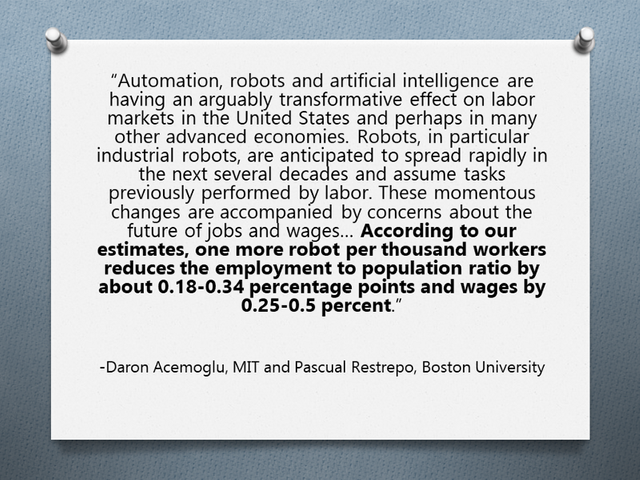
A first of its kind 2017 study even looked at the impact of just industrial robots on jobs from 1993 to 2007 in the US and found that every new robot replaced around 5.6 workers, and every additional robot per 1,000 workers reduced the percentage of the total population employed by 0.34%, reduced wages by 0.5%, and increased GDP by 0.13%.
During that 14-year period of time, the number of industrial robots quadrupled, and between 360,000 and 670,000 jobs were erased. And as the authors noted, “Interestingly, and perhaps surprisingly, we do not find positive and offsetting employment gains in any occupation or education groups.” In other words, the jobs were not replaced with new jobs.
Remember, this finding was from looking at industrial robots only, not all robots, not software, and especially not artificial intelligence. Consider all of it, and how quickly advancements in AI are being made such that cars and trucks are already driving themselves, and machine learning algorithms are already learning how to write their own code, and we’re looking at something entirely new in human history.
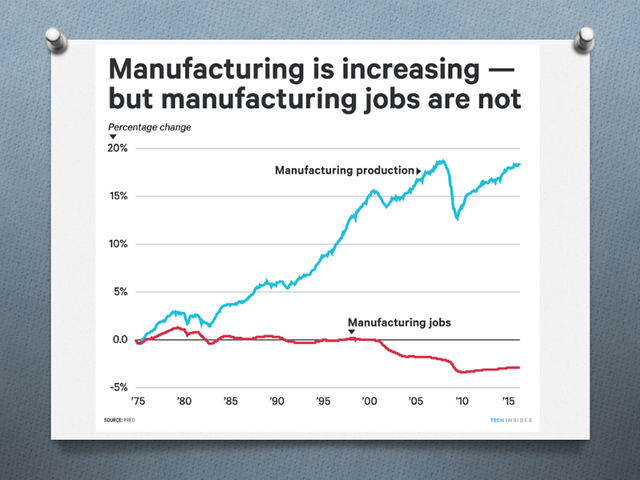
But to see this, we have to open our eyes. In the US we’ve lost manufacturing jobs over the past three decades, and whereas 8 out of 10 Americans know that, only 26% of Americans know manufacturing output has increased over that same time. In other words, most Americans have no idea America is manufacturing more now than ever, despite the loss of manufacturing jobs.
Americans also think the jobs being lost are due to immigrants and offshoring, but a 2015 Ball State University study that looked closely at this found only 13% of job loss was NOT due to efficiency gains. According to the study, in 2010 it was possible to accomplish with 12.1 million workers what once would have required 20.9 million workers just 10 years prior.
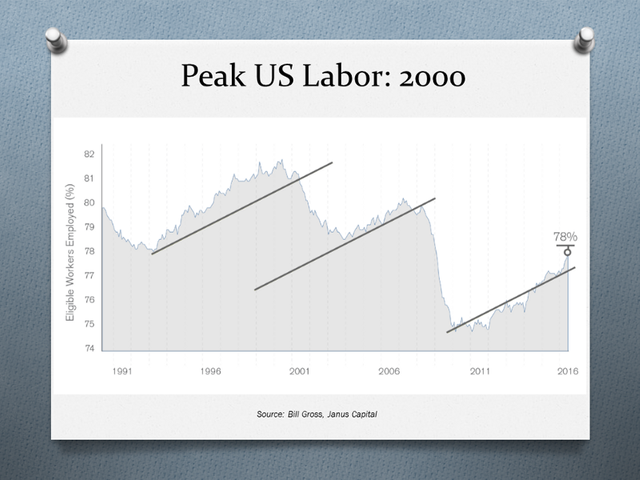
Now let’s consider again the oil market downturn. It effectively simulated a recession. Recessions always squeeze out unnecessary labor. In the US, the result is that we hit peak labor back in 2000. So what happens to workers all over the world during the next global downturn? How many workers will never be rehired because they already aren’t needed?
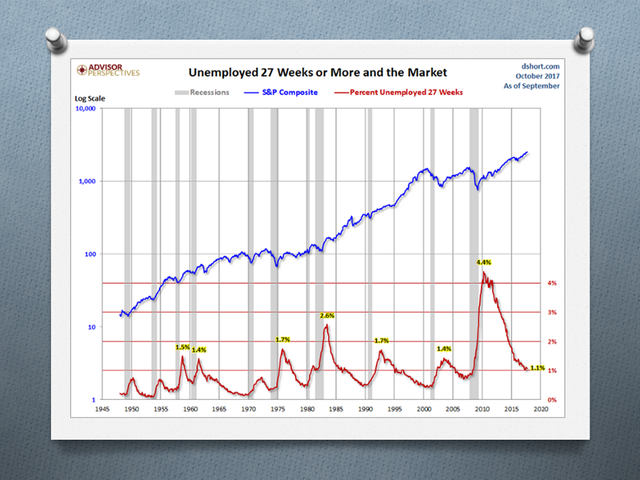
It will also likely take longer for those newly unemployed to find new jobs, as more and more people compete in our ongoing game of musical chairs to find a seat not newly filled by hardware or software. In the US, this has been the trend for 70 years.
And what will these new jobs people find look like? Because again, according to long-term trends, not only will they take longer to find and pay less, they’ll also not be traditional jobs, and will result in more monthly variance of incomes. In the US this century, all 9 million net new jobs we’ve created are forms of alternative work, and if we look at the bottom 20% in the US, 74% of workers now see their incomes vary by 30% month to month.
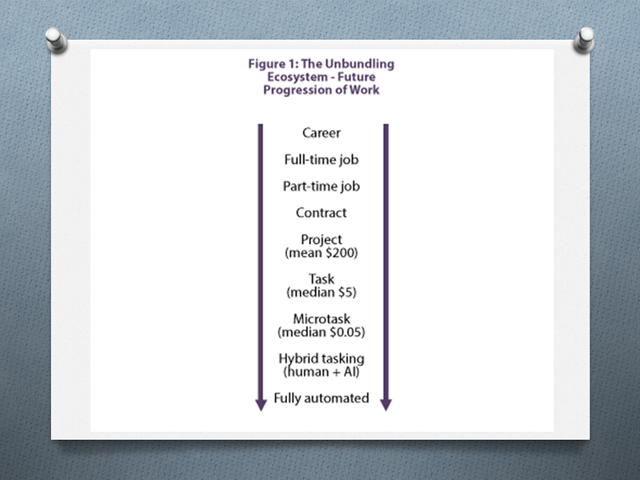
What this boils down to is that government-provided safety nets all over the world are designed around a notion of 20th century jobs where jobs once fell from job trees and provided regular, dependable income, with benefits, for decades at a time. Automation has since transformed the way we work. It’s also transformed businesses themselves.
As technology enables businesses to do more with fewer workers, that means to obtain “full employment”, we also need more businesses, or we all need to work less. So what do we observe?
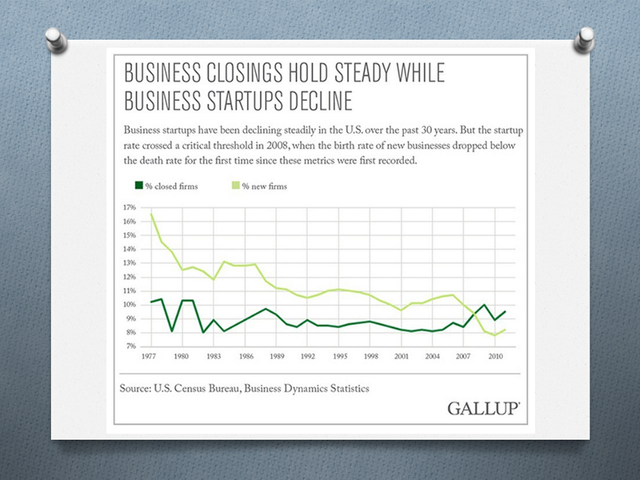
Well, in the US, startup creation has been declining for decades, and in fact, in 2008, the death rate of businesses surpassed the birth rate for the first time ever recorded. However, the number of billion-dollar startups is trending upwards. Apple, Google, Facebook, Amazon, and Microsoft are together worth $2.7 trillion and employ merely a fraction of the top companies like GM, Ford, Exxon, GE, and IBM did decades ago.
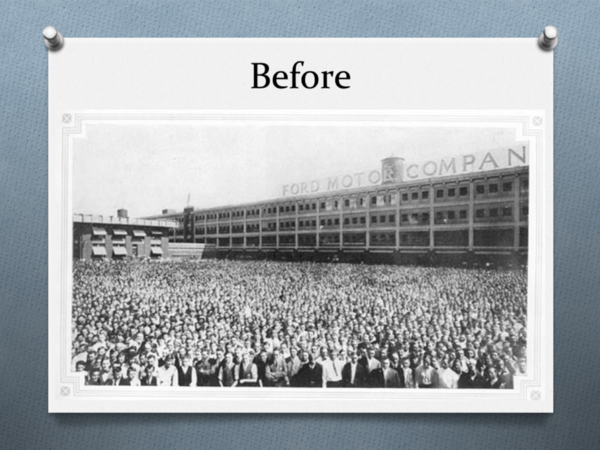
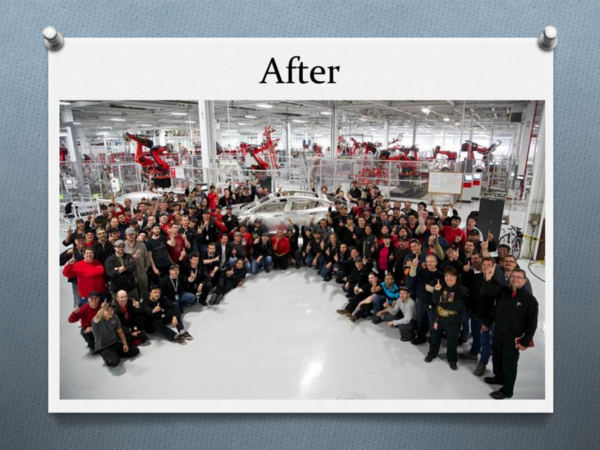
Perhaps most importantly, discretionary incomes are falling. Despite rising productivity, people have a decreasing percentage left of what they earn to spend on what’s being made more and more by machines, after covering basic needs.
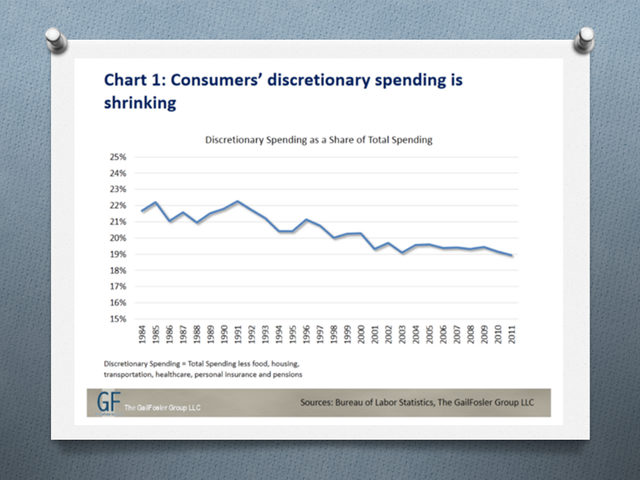
This is not a sustainable trend. People have to be able to afford what machines are producing, or else what’s the point of machines producing any of it in the first place?
And what are the social consequences of societies increasingly starved of income, and where inequality only continues to grow more extreme? I believe we’re already seeing the consequences in the form of reactions like rising nationalism, xenophobia, and drug addiction. Trump and Brexit are warning signs that we can’t stop ignoring the social effects of technology.
We have to take our heads out of the sand. We can’t look at a low unemployment rate and think everything is okay. We can’t tell a person who just went from a 40-hour per week career with benefits and a sense of security, to three different jobs/gigs without any benefits, working longer hours to earn less total income in a far more insecure life of just mere survival.
We can’t look at a world where 5 men now own more wealth than half the planet and brush it aside as unimportant. Inequalities affect societies across a wide range of measures. As inequality grows, social cohesion decreases, crime increases, gun violence and drug abuse rises, overall physical and mental health worsens, life expectancy falls, emotional well-being declines, and even economic growth suffers.
Perhaps worst of all, are the effects of extreme inequality on our youngest.
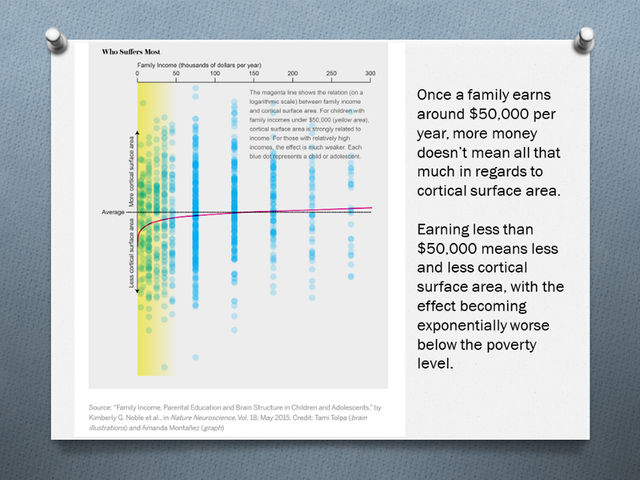
The lower a socioeconomic status a child is born into, the worse they will perform on cognitive tests measuring language skills, short-term memory, long-term memory of facts and events, and spatial relationships. Why? Because the less income parents have, the less cortical surface area the brains of their kids will end up having.
Decades from now, we will look back at this as nothing less than barbarism. How could we ever have thought it okay to inflict brain damage on untold millions of humans as punishment for not choosing wealthier parents?
Furthermore, how much are we holding civilization back by allowing impoverishment to continue? How much more could we accomplish as a species, if we made the choice, that’s right, THE CHOICE, to abolish poverty and extreme inequality forever, by simply investing in humanity — in each other?
What if we chose to lay a foundation underneath all of our feet that from birth to death prevented everyone ever again, from not having enough to survive?
What would you do in life, if you started each month with enough money to live?
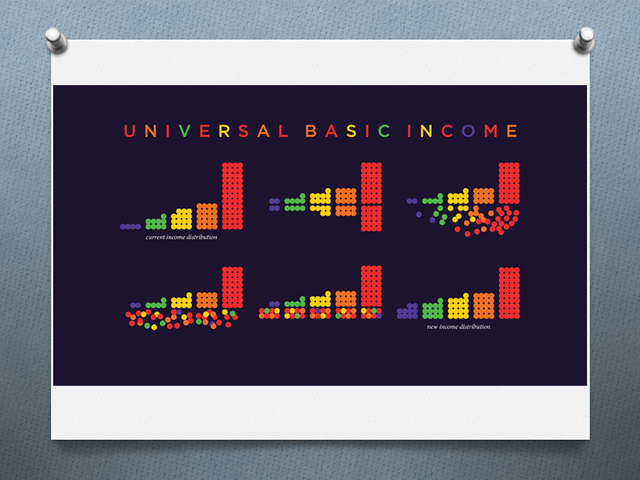
This is the idea of unconditional basic income. It’s not a new idea, but it’s one that was new to me back in 2013 when I first started searching for solutions to technological unemployment. It’s also not an idea confined to the political left or right. It crosses all lines, with both supporters and detractors across the entire political spectrum, from civil rights leading Martin Luther King, Jr. to free market-loving Friedrich Hayek.
UBI is the provision of a regular and non-withdrawable cash stipend to individuals, without conditions, of sufficient size to create an earnings floor above the poverty line.
This may sound simple, but there are many misconceptions. One of the first questions asked is where the money comes from. Well, it comes from all of us. Everyone gets the same amount, but we all contribute varying amounts to make it possible.
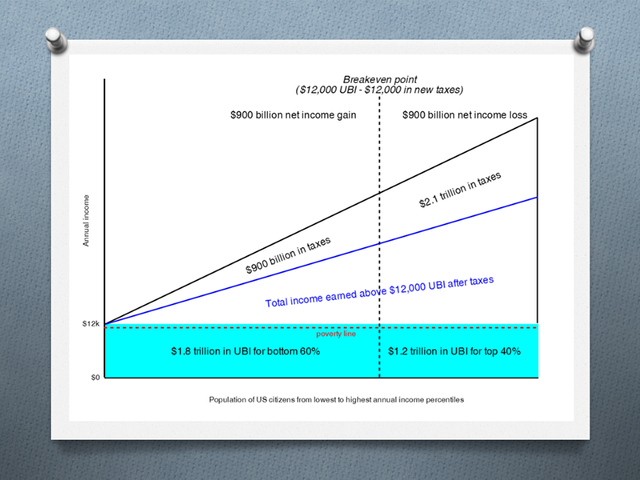
It’s really important to understand this, because it also answers another frequently asked question and common misconception, which is the cost. Because everyone pays into UBI and everyone receives UBI, the cost is the net cost, not the gross cost.
Think of it this way. Imagine that UBI is implemented tomorrow and your taxes go up $12,000 in order to pay for it, and in return you receive $12,000 in UBI. How much did it cost the government to provide you UBI? Aside from administration costs of less than 1%, it cost nothing.
All net payers cost nothing to provide UBI to, and the cost to net receivers is the total amount of UBI, minus the amount in additional taxes imposed. In other words, the UBI can cost the same as its cousin the negative income tax, birthed by Milton Friedman.
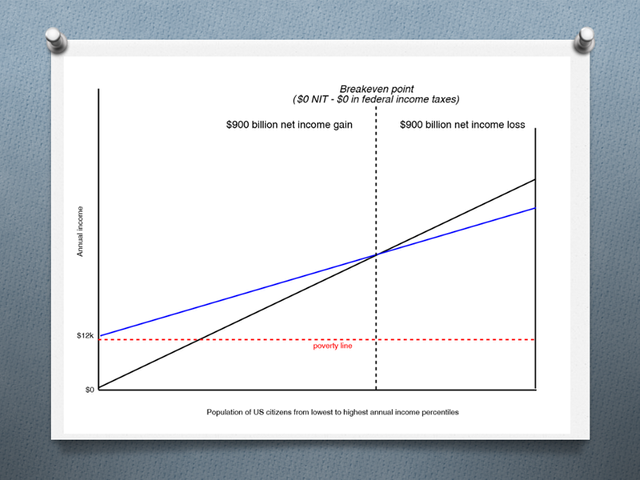
Although universal, a UBI functions to circulate income from top to bottom, where it then circulates right back up again. In other words, UBI closes the loop of an economic system currently reliant on infinite growth. Basic income creates a sustainable ecosystem. In doing so it also answers the question of where the money comes from in a novel way. It comes from where it’s going, like water itself.
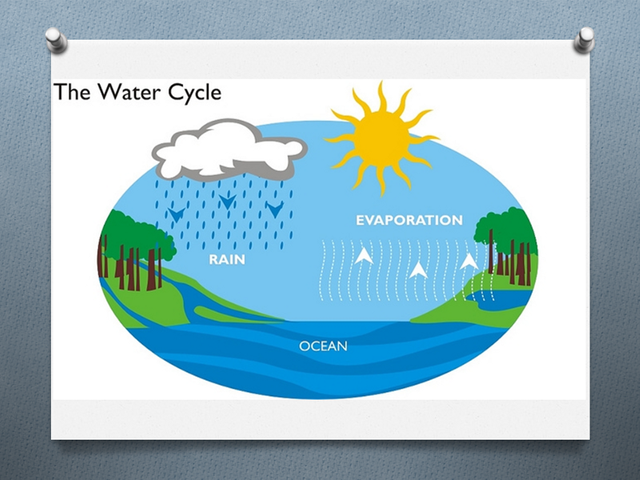
Understand this, and understand another fear as just a fear, that is the fear of rampant inflation. Few models of UBI involve monetary expansion. UBI is instead a circulation of existing money from those effectively hoarding it to those who will immediately spend it.
This increased circulation also leads directly to a stronger economy through multiplier effects. Someone on Wall Street getting another dollar adds 39 cents to the economy, whereas a low-income earner getting another dollar adds $1.21 to the economy. That’s three times better for the economy. So making sure everyone in the bottom 60% has money to spend into the economy makes a hell of a lot more sense than the top 20% being shoveled even more money.
As a concept, this may sound all well and good now, or still completely bonkers. I don’t know about you, but how something sounds only goes so far with me. The big question is does it work?
Well, countries around the world are increasingly asking that same question. Trials have begun in Finland, the Netherlands, Canada, Kenya, Uganda, Brazil, Spain, Italy, and even the US, with more trials in the works for Scotland and likely even India and more.
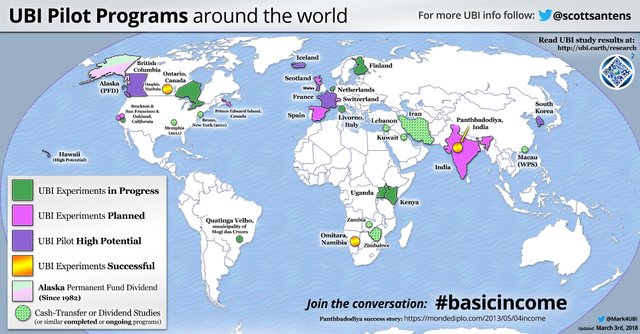
Click for updated map if available
But we actually don’t have to wait for these. When I first started looking into UBI, I was shocked to discover just how much evidence there already was for those seeking it. There’s already so much we know.
Here are just some of the many observations that have struck me the most, collected from a variety of pilots and studies from the United States, Canada, India, Namibia, and Lebanon.
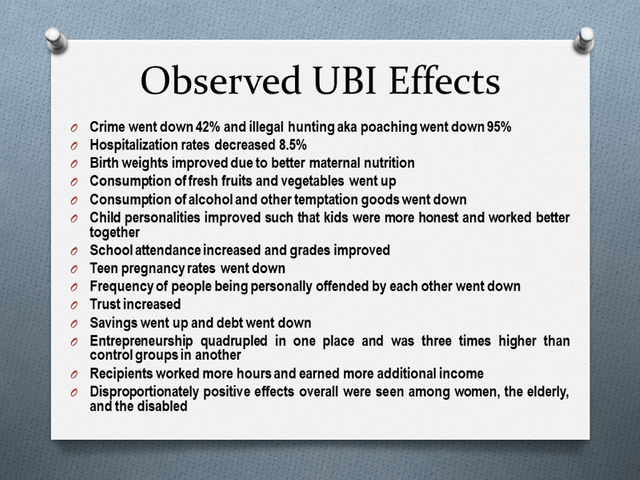
Crime went down 42%. Illegal hunting aka poaching went down 95%. Hospitalization rates decreased 8.5%. Birth weights improved due to better maternal nutrition. Consumption of fresh fruits and vegetables went up. Consumption of alcohol and other temptation goods went down. Personalities improved such that kids were more honest and worked better together. School attendance increased and grades improved. Teen pregnancy rates went down. Frequency of people being personally offended by each other went down. Trust increased. Savings went up and debt went down. Entrepreneurship quadrupled in one place and was three times higher than control groups in another. Recipients worked more hours, and earned more additional income. And disproportionately positive effects overall were seen among women, the elderly, and the disabled… in other words, the traditionally marginalized.
Some of these results have been observed once, some multiple times. Increased entrepreneurship for example seems to be a common effect of giving people UBI, for I think three main reasons: more capital, more customers, and more risk-taking.
Fear of risk leading to catastrophic failure prevents far too much innovation. When a New York Times reporter asked him how he felt about failing 700 times, Thomas Edison responded, “I have not failed 700 times. I have not failed once. I have succeeded in proving that those 700 ways will not work. When I have eliminated the ways that will not work, I will find the way that will work.”
UBI transforms failure from an existential risk to an opportunity to learn what doesn’t work. Failure is not a bad thing. Failure is how we learn. Failure is how we innovate. What’s bad is when we arrange things so that failure is life-threatening instead of life-instructing.
Now, another common result of providing basic income is healthier babies, and this is a particularly profound finding. For those familiar with epigenetics, where environments can turn off and on genes in the womb, the implications of babies born healthier should knock you back to consider the generational effects.
For example, a high risk for obesity can be the product of starvation in the womb, as babies are consequently programmed to store more calories. So consider the implication of generations of kids growing up finding it much harder to become obese.
Also consider just how much societies with basic income will save in the form of reduced expenditures on crime, poor health, and lost productivity whose costs along with many others, actually exceed the cost of implementing UBI. Functioning as a social vaccine, UBI is an ounce of prevention instead of a pound of cure.
Then there’s also what I call the “Einstein Cost”, which is the cost to all of society if even one new Einstein is out there right now, not being the next Einstein, thanks to being too busy simply surviving day by day working multiple pointless jobs a machine could do.
If we step back and look at the big picture, it’s not adopting UBI that costs too much!
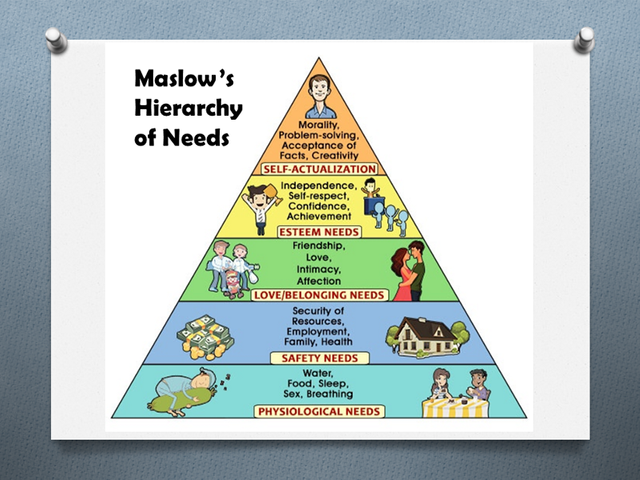
What we’re really seeing here when it comes to observed effects of basic income is essentially Maslow’s Hierarchy of Needs in action. Everyone has basic needs, and when those needs are covered, people then pursue higher order needs.
I believe our higher needs are even more important to us than our basic needs. Suicide is an action not often taken by someone who is starving. It’s an action taken by those who feel there may just be nothing else to life than just not starving. Basic income, by starting everyone higher up Maslow’s hierarchy, makes it far more possible for everyone to climb to the top instead of getting stuck at the bottom. Life is not meant to be a treadmill to nowhere. Life is meant to be a constant journey.
Those who think basic income in any way inhibits work are therefore missing three key understandings.
The first is that intrinsic motivation is far more powerful than extrinsic motivation. That is, what we do because we simply want to, for internal reasons like autonomy, mastery, and purpose, we do with much more engagement than what we do for external rewards.
In fact, external rewards have been shown to even inhibit work that requires creativity, and studies have also shown that just being given the option to refuse a task, increases engagement with that task. Fully voluntary work is far more motivating than forced work.
The second key understanding is just how much non-universal, conditional welfare systems disincentivize work. No one sees higher marginal tax rates than people on welfare — no one. As someone on welfare earns income, they lose their benefits. The result is the reality of people being barely better off accepting employment, or even becoming far worse off.
The most extreme examples are those with disabilities who must prove they are “unfit to work” (which ends up excluding around 80% of people with some form of disability) and who then face losing 100% of their disability income for earning additional income. Basically, welfare is a system where governments pay bureaucrats to make sure people don’t work, and to punish them if they do by removing their benefits. It’s also all about making decisions for people, instead of letting them make their own decisions. Welfare agencies destroy agency.
The third key understanding of how UBI enables more work is the recognition of unpaid work as perhaps the most valuable work of all. In the US, the amount of unpaid care work alone is estimated at $700 billion per year, or 4.3% of GDP, and it’s done by almost one-third of the population, mostly women, about 1.2 billion hours every week, the equivalent of about 30.5 million full-time care aides. What would happen to the economy if all unpaid care workers went on strike? What about other kinds of unpaid work?
If someone with a basic income quits their minimum wage job to instead develop software for the open source community or dedicate themselves to scientific research, is society worse off? If someone quits their job as a telemarketer to raise their kids instead of outsourcing that care work to others, is society worse off? Why is it only considered work if you care for someone else’s kid and not your own?
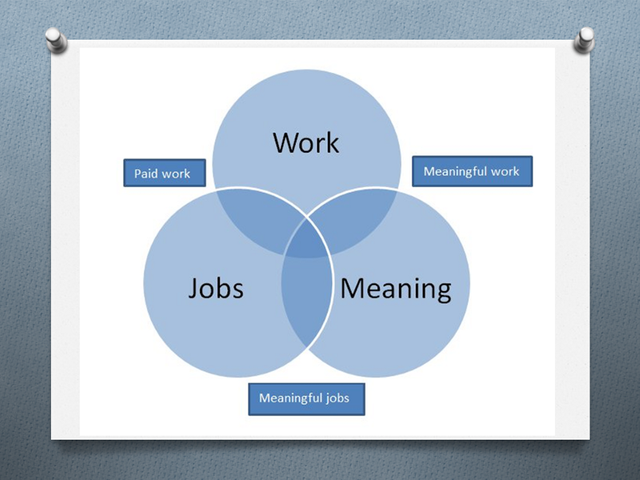
We must come to understand that work and jobs are different. Not all work is a job. Not all work is meaningful. Not all jobs are meaningful. Not all jobs are work. And the pursuit of jobs, work, and meaning are all better enabled when one’s basic needs are met.
In fact, I myself have a basic income. Ever since January of 2016, I start each month with $1,000 as my income floor. It’s crowdfunded via Patreon, and I would not be here right now without it. It enables me to pursue the work I consider most meaningful, which is researching, writing, and speaking about basic income.
The biggest understanding I’ve gained from my basic income is a sense of security. Until I had security, I had no idea how little of it I had prior. It was just a word with a definition. Now I FEEL it. Knowing every month I’ll be able to cover my basic needs is a sense of freedom I can’t properly convey to those who don’t already have that freedom.
Basic income has also increased my resilience to disaster. I crossed paths with a tornado last year, and I was able to cover that unexpected expense to my car. Imagine how much of a difference UBI would make to all victims of events like floods, fires, and hurricanes? Is UBI perhaps even justified by climate change alone?
I’ve also begun to think differently about things like intellectual property, and even money itself. What I write, I write for people to read. The more people who read what I write the better. So why would I choose to publish behind a paywall?
This makes me wonder, is it possible that with UBI, the open source movement will massively expand? If you’re no longer forced to sell your work to live, will more of you freely provide your work? Is it possible that GitHub pull requests would multiply overnight, or that wikis of all kinds would see even more pages expanded and created?
Basically, basic income allows everyone to say “YES” to what we otherwise might have to say no to in order to survive. On the flip side however, it also allows everyone to say “NO” to what we might otherwise have no other choice but to say “yes” to.
This in turn means UBI could also negate the need for minimum wages. If everyone has the ability to refuse to work for what’s considered too low a wage, wages must increase to attract people to do those jobs. It’s also about more than jobs. Think about how many women, and men too, are in abusive relationships simply because they can’t afford to leave them, or even how much speech is left unexpressed, in fear of losing one’s present job, or being denied a future job.
Is it even possible, that rights like freedom of expression don’t truly exist without economic rights? Does a lack of basic income even infringe on citizenship itself by making people prioritize jobs over voting, where that second or even third shift at work has greater priority than being an informed and engaged citizen?
At this point, perhaps you’re thinking that no matter how good of an idea UBI is, and how affordable it is, and how much new and valuable work people will do, perhaps even for free, that people simply don’t deserve it.
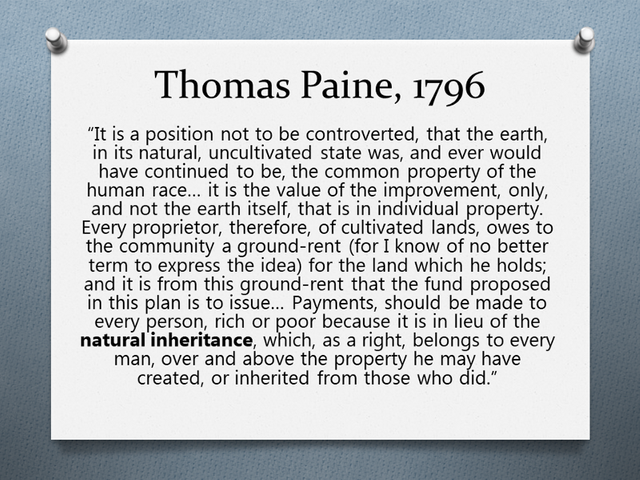
Well, here’s the thing. First, no one created our natural resources. No one created the land. People only ever called dibs on it many centuries ago. The Earth belongs to all of us equally. This was essentially the argument of Thomas Paine who said “It is a position not to be controverted that the earth, in its natural, uncultivated state was, and ever would have continued to be, the common property of the human race… Every proprietor, therefore, of cultivated lands, owes to the community a ground-rent for the land which he holds; and it is from this ground-rent that the fund proposed in this plan is to issue.” This is even the logic behind the annual Alaska dividend and also provides strong support for ideas like land value tax dividends, and carbon tax dividends.
Next, all of this technology around us has roots in taxpayer dollars because Level 1 R&D, aka basic research, is simply too risky for the private sector to invest in. All of the data around us is also generated by us to the tune of an estimated $2,000 per year on average and growing. And finally everything we create and discover is simply the next link in a kind of generational blockchain that goes all the way back to the very first use of tools at the Dawn of Man.
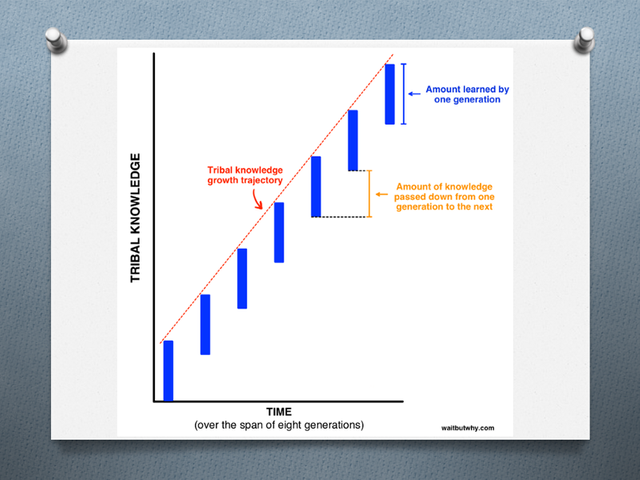
As Sir Isaac Newton said, he stood on the shoulders of giants. He didn’t do what he did on his own. What Newton did was only possible because of everything done before him by those before him. He inherited the knowledge that he built upon. One can say all of civilization is simply something for nothing. All of it’s inherited.
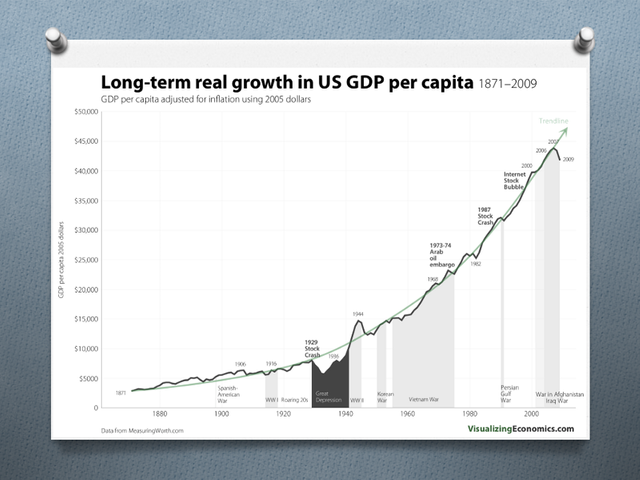
Economic output per person in the US grew roughly seven-fold over the course of the 20th century from roughly 7,000 to 52,000 in 2017 dollars. If the economic gains of the 20th century continue at the same pace in the 21st century, then by 2100 it’ll be roughly $365,000 per person. A person born at the end of this century will have done absolutely nothing to enable this enormous gain. All of it will exist as a gift from the past, from the accumulation of technological and scientific knowledge received, simply by being born.
Now imagine a UBI is indexed to grow with productivity, and therefore with automation. The more automation, the higher the output, the higher the UBI… Instead of fearing automation, people would want as much automated as possible, to maximize their UBI. Wait? People in the future should be paid six figures simply for being alive? Yes! Because it’s their inheritance!
UBI is our natural inheritance.
UBI is our technological inheritance.
UBI is our return on investment as taxpayers.
UBI is our big data dividend.
In fact, I think understanding UBI as a data dividend will be of increasing importance. Companies like Facebook, Google, and Twitter are worth billions not because of their infrastructure but because of their users, and these users live all over the world. They’re more than citizens. They’re netizens. And they perform uncompensated work with every status update, with every search, and with every tweet. This work is owed what I refer to as a netizen dividend, because it’s owed to those who comprise networks.
We need to recognize what we do online as a form of atomized work — work so small we don’t even see it as work. And we need to see it all around us. Our data generation is omnipresent. Everything we do, and even everything we don’t do, generates data. But only stockholders are financially benefiting from it all.
This needs to change, and everyone here can help make it happen. The answer to how exists to a great degree I think in blockchain development and cryptocurrencies.
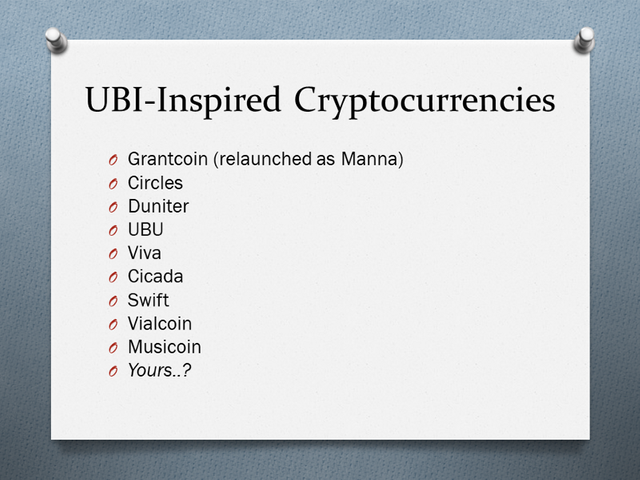
Netizen dividends can be built into any cryptocurrency, and some already do. But also take for example the platform Steemit. It’s a kind of hybrid between a blogging platform and Reddit built on a blockchain. People create posts, which are voted up. How many votes they get determine how much Steem the posts earn, which gets divided between the person who created the post, and those who upvoted it. This currency is then exchangeable for other currencies like bitcoin and ethereum, which can in turn be exchanged for traditional currencies.
In this way Steemit’s users are treated as both freelancers and stockholders. There’s no longer any need to follow the old model. Every platform that does anything can follow this same new model built on blockchain technology. And I think the only kind of company that can make Facebook the next MySpace will follow this model and incorporate a netizen dividend into it. Imagine earning multiple streams of income across a dozen different platforms you use, simply for using them.
As a young superhero once learned the hard way, with great power comes great responsibility. Software developers are I think a new kind of hero. The automation of human labor is an incredible boon to all of humankind, but not on its own. Systemic changes must accompany it so that the benefits of automation accrue to everyone.
I cannot stress enough how important it is for the long-term survival of our species, to shift from the idea of conditionally providing charity, to unconditionally distributing prosperity. We are a young species, but in order to become an old species, we’ve got some incredible challenges ahead of us that require long-term thinking.
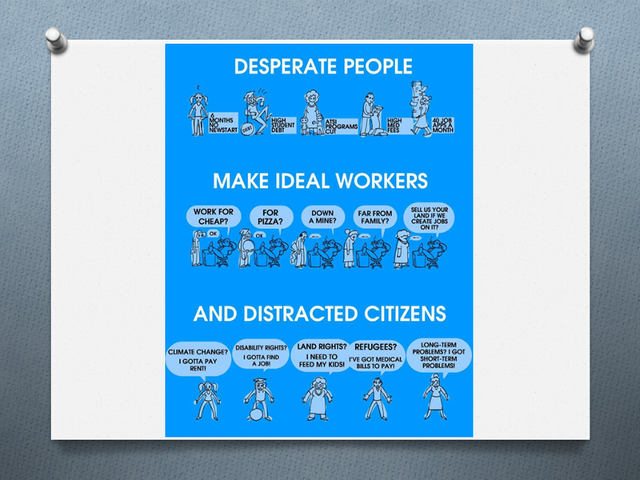
Climate change is one of our biggest challenges and it very well could be the end of us. To tackle it, we have got to stop only thinking about survival. As long as we’re just worried about the day to day stuff, our minds aren’t free to tackle the big picture. As long as income remains coupled to work, an unemployed coal miner is going to want to keep digging coal. Billions of decisions every day will continue being made for the sake of making it to the next day instead of the next millennium.
We’re all evolved primates. We’ve come a long way, my hairless ape friends, but we’ve got something in our DNA that switched from brilliantly adapting us to our environment, to being an anchor tied to our ankles. It’s called the stress response, or more popularly, the fight-or-flight response.
Back in the day, many thousands of years ago, it was a clever emergency gear where long-term higher-order creative thinking shut down, and we were temporarily enabled to think faster, react quicker, be stronger, move faster, run longer, and think only about survival… those were the humans who survived. It was basically a superpower.
The problem is we don’t live in that same world anymore. We aren’t being chased down by lions or being eaten by wolves while sitting in front of our computers in our air-conditioned offices, and yet our fight-or-flight responses are still being activated. In fact, for far too many, daily existence is no longer anything but fight-or-flight.
The stress response was only ever meant to be used in case of emergency, not be a persistent state. Never ending stress leads not only to all kinds of health issues, but to social issues like displacement aggression and learned helplessness. It rewires our brains to stay stressed, and as a result, our gaze as a species is looking down at our feet, instead of up to the horizon.
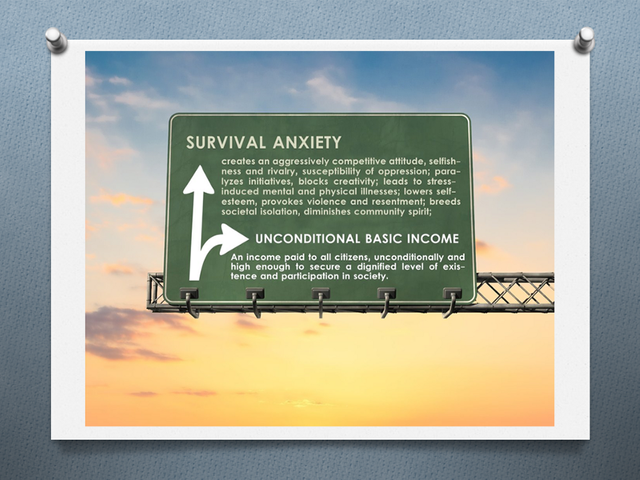
Chronic stress is a mind killer. By design, it limits us to short-term thinking. It creates a scarcity of mental resources. It is a tax on the brain, that when lifted, has even been measured as being equivalent to a gain of 14 IQ points. This is because concern about not having enough operates as a kind of software program running in the back of our minds that limits available resources available to be applied elsewhere. Reaching a state of having enough to no longer worry, results in freeing those resources.
With every year that passes, technology is capable of doing more, and at an exponential rate. So let me ask you this. Let’s pretend that tomorrow everyone gets a button-triggered device that would end the world when pressed. How long do you think our world would survive?
Is the answer then to not invent such god-like to us technologies? I don’t think so. Such a technology would really be just another bone of sorts. Our challenge is that as technology advances, we need to advance along with it. We need to become humans who would not press that button.

So how do we do that? Well consider two societies. One society starts everyone at the bottom of Maslow’s pyramid and says, “Good luck, asshole. Every man for himself.” Another society starts everyone at the middle of the pyramid, and says “We care about you, and we trust you. We’re all in this together.” Which society is less likely to press that button? I want us to be that society.
This is why I feel so strongly about UBI. If we’re going to beat climate change, if we’re going to survive future advances in bio-technology, nanotechnology, and general AI… if we’re going to use Elon Musk’s Neuralink to interface with AI and in so doing become a civilization where that button really does exist, we have no choice but to become better. We have to. And we have to do it now, because we needed to do it yesterday.
You all have a responsibility which cannot be ignored. You can’t just automate human labor out of existence without recognizing what else must be done. Technology does not exist in a vacuum and those who understand technology have a responsibility to help steer the ship instead of just praying for a lack of icebergs. The consequences of doing nothing will only get more disastrous, whereas the alternative is a future that has never shined with brighter potential. For the problem is not that jobs are being automated, it’s that we require jobs for income, and for some reason think 40 hours is “full-time.” We must learn to share the wealth, and also share the hours.
Right now is a pivotal moment in human civilization. Which course will you help us take? The one with more fear and anger and insecurity and stress? Or the one with more hope and love and possibility, and above all, more time?
We have the opportunity to forever free humanity from drudgery and toil, but as long as people require money to live, and jobs are the primary way of obtaining money, people will fear automation. Let’s remove that roadblock to human progress. Let’s erase the existential fear of meeting basic needs. No more just surviving. It’s time to start thriving.
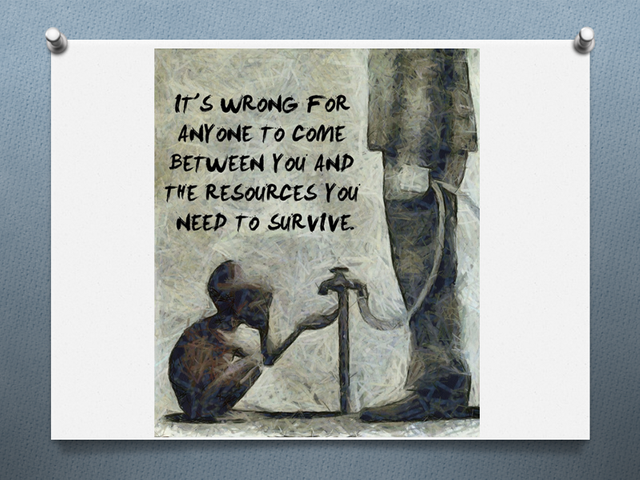
There’s also one last thing I’d like you to consider. If it’s true that we all have the right to life, and life cannot be taken from us, does anyone truly have the right to life if what is needed to live is withheld on the condition of being servile?
Think hard about that, because it’s a question I think people mere decades from now are going to look back on and wonder why it was ever even a question at all.
Unconditional basic income is not “free money”. It’s freedom. And freedom belongs to all of us.
It’s time for technology to serve all humankind. Jobs are for machines.
Life is for people.
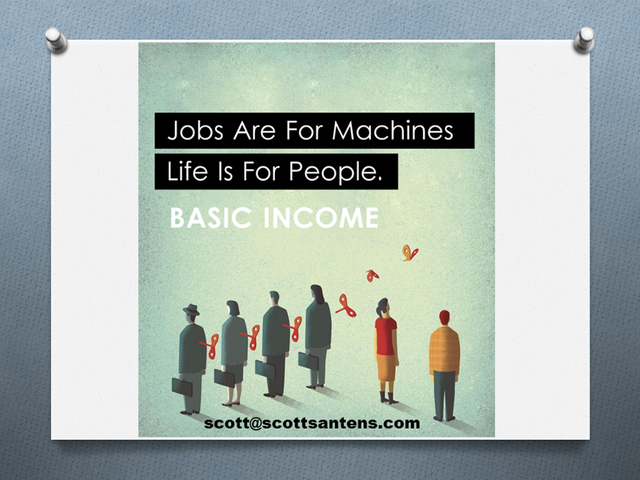


Amazing read. I am a believer of permaculture and it is all about care for the future. I love what this article talks about, I am not sure about how things are going to play out, but technology will probably be a part of it. Love it!
I haven't read anything of the likes on steemit like for ever. I will re-steem this cause it is clearly undervalued and underappreciated. Hopefully it will bring some constructive comments your way too.
I find this post through reddit so you know. Also following, starting now.
Thanks for the complimentary comment and re-steem! If you're interested in further reading, I've posted a lot of other articles about UBI here on Steemit, and even have a FAQ to help people explore what I've written based on questions commonly asked in response to the idea.
I am not a very intelligent guy, Especially when it comes to this kind of complicated matters. But I was watching another guy today in a youtube video about UBI and how he thinks it is the only solution for the future of human kind.
I think that there will be a full out war between mega corps and governments if UBI is going to be implemented cause in my eyes is a war about resources and not just, I am just tipping my fingers at these waters and obviously I can be very wrong about that claim.
Your post is an oasis in a dessert of shitposts for steemit. Best of luck man.Sorry for just finding out about you.
Sharp observation. Thank you!
A bit TL;DR but I'm interested in the topic, therefore am resteeming this for my future re-readings :-)
Thanks for sharing.
from each according to his abilities.
to each according to his needs.
How well has that worked out?
I just posted this, so I know you didn't even read it, and yet here you are feeling it necessary to comment. I don't appreciate you posting your uninformed views as a comment on every single one of my posts without even reading them.
We've already covered this and I'm tired of covering it with you. Milton Friedman was not a socialist. Friedrich Hayek was not a socialist. The state of Alaska is not a socialist state. Monopoly is not a game about communism For the love of all the gods, go learn what socialism and communism both actually are, so you can tell the difference between those and capitalism provided with money to create customers.
Markets require money as a means of exchange. No money, no way of conveying demand signals to be met by demand. UBI is simply the provision of enough means to signal demand within free markets. Consumers can choose what to buy, instead of government bureaucrats telling them what they need, and depriving them of the ability to signal their demand for private goods and services.
Since you don't seem to care to read anything I have to say on the topic, I suggest listening to why libertarian economist Mike Munger thinks UBI is a good idea. He recognizes that it is a fact of life that the government taxes people, and provides goods and services using that tax money. Those of us who care about liberty should care about providing what government provides in a way that minimizes the size of government and maximizes freedom. UBI accomplishes that.
Those of us who care about capitalism should also care about what's happening as has already been happening for decades with the automation of human labor. The percentage of revenue going to wages and salaries has been going down, while the percentage going to profits is going up. Consumer purchasing power is declining because customers are losing the ability to spend. The middle class is eroding, and the capitalism-saving answer is to provide money so as to avoid the collapse of markets starved of consumer demand.
If you like capitalism, and let me just say I certainly do because it works, then you need to get behind the idea that will save it from destroying itself.
I just posted this, so I know you didn't even read it, and yet here you are feeling it necessary to comment. I don't appreciate you posting your uninformed views as a comment on every single one of my posts without even reading them.
I actually did read it. It wasn't hard. You must read very slow.
I asked a simple question. How has it worked out when tried in the past.
You don't seem to want to answer that.
Ok..if you're afraid to discuss your post I won't pressure you.
You did not read something that took me one hour to record reading aloud in a matter of seconds.
And your question is a stupid question, because again, UBI isn't socialism or communism.
"From each according to his abilities to each according to his needs" does not describe UBI. Does it describe the Alaska dividend? How does a universal payment to all Alaskans rich or poor get perceived as "to each according to his needs" in your mind?
How does "from each according to his abilities" describe the funding component of the Alaska dividend that is not based on ability but on who owns natural resources and the idea of charging companies a fee for taking it out of the ground and selling it back to us after they process it?
By the way, you never answer any of my questions. Were Milton Friedman and Friedrich Hayek socialists or communists?
Answer the question.
nope...milton friedman and friedrich Hyaek were not socialists.
but I didn't mention socialist.
I merely asked how something that had been tried in the past had worked out.
odd thing...speaking out loud doesn't correlate to reading speed.
I find it amusing that you are so defensive...
even more amusing...I agree that there is a serious problem
i suspect that old ways of doing things will not fix a new, never seen before, problem
You seem to imply that UBI has been tried in the past. It has not. There have been successful if limited experiments. But a real UBI has never been implemented.
We all know what the phrase "from each according to his ability to each according to his need" is in reference to. I also have a functioning memory, and know your response over and over again to everything I've written has been the same general response.
Congrats. You're right. Friedman and Hayek were both capitalists who both supported UBI. Understand that and understand why, and UBI becomes a pretty common sense solution to the problem facing us presented by automation.
we need to become an economy based on need not want as we have in our consumerism economy we have now
one more thing.
(two actually)
I don't like your attitude...you're very rude...so this will be my last response.
I dont' see why you say 'matter of seconds' I had over five minutes to leisurely peruse your post.
I admit that I didn't' watch the videos..
Good. Bye.
This post, with over $50.00 in bidbot payouts, has received votes from the following:
minnowbooster payout in the amount of $112 STU, $197 USD.
sneaky-ninja payout in the amount of $8 STU, $14 USD.
For a total calculated bidbot upvote value of $120 STU, $211 USD before curation, with approx. $30 USD curation being earned by the bidbots.
This information is being presented in the interest of transparency on our platform @scottsantens and is by no means a judgement of your work.
the problem with basic income is non controls were the money goes the goverment does not want it going into things like bitcoin or gold
You got a 3.33% upvote from @brupvoter courtesy of @ran-a-banana!
Nice
Congratulations! This post has been upvoted from the communal account, @minnowsupport, by scottsantens from the Minnow Support Project. It's a witness project run by aggroed, ausbitbank, teamsteem, theprophet0, someguy123, neoxian, followbtcnews, and netuoso. The goal is to help Steemit grow by supporting Minnows. Please find us at the Peace, Abundance, and Liberty Network (PALnet) Discord Channel. It's a completely public and open space to all members of the Steemit community who voluntarily choose to be there.
If you would like to delegate to the Minnow Support Project you can do so by clicking on the following links: 50SP, 100SP, 250SP, 500SP, 1000SP, 5000SP.
Be sure to leave at least 50SP undelegated on your account.